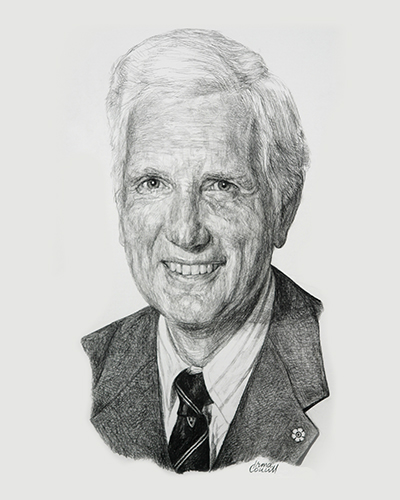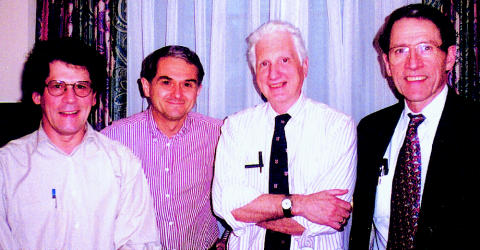2001 INDUCTEE Charles Scriver, MD Cells, Genetics & Genomics, Public Health, Health Promotion & Advocacy, Skin, Bones, Muscles & Joints
November 7, 1930
(Montréal, Québec)
April 7, 2023
MDCM, McGill University (1955)
2016: Commander of the Order of Montreal
2010: Pollin Prize for Pediatric Research
See All AwardsAwards & Honours:
2016: Commander of the Order of Montreal
2010: Pollin Prize for Pediatric Research
2010: American Pediatric Society with the 2010 John Howland Award
2008: Paediatric Academic Leadership Award for Clinical Investigation by the Paediatric Chairs of Canada
2007: Honorary DSc, McGill University
2002: Honorary DSc, University of British Columbia
2001: Canadian Science and Engineering Hall of Fame
1997: Grand Officier of the Order National of Québec
1996: Companion of the Order of Canada
1995: Prix Québec Wilder-Penfield
1992: Honorary DSc, University of Manitoba
1991: Fellow of the Royal Society of London
1985: Officer of the Order of Canada
1981: McLaughlin Medal, Royal Society of Canada
1979: Canada Gairdner International Award
1978: William Allan Award of the American Society for Human Genetics
1973: Fellow of the Royal Society of Canada

Identified and developed a treatment for rickets in Quebec

The Father of modern genetics in Quebec
Dr. Charles Scriver committed his life to the study of genetic disorders in children. Most notably, he and his collaborators discovered hereditary forms of rickets in children and how the disease could be treated with the addition of vitamin D to marketed milk. This finding significantly raised society’s awareness of the causes and the genetics of the disease. Scriver and his colleagues subsequently developed and instituted, through the ground-breaking Quebec Genetic Network, a method to examine the blood of newborn infants and screen them for a number of inherited biochemical conditions, such as PKU and hypothyroidism, allowing early and effective treatment. Dr. Scriver also played a lead role in exploring the wider social issues that accompany this research. Beyond clinical treatment, his ability to translate fundamental laboratory findings into broader social understanding of human diversity empowered individual patients, families, communities and policymakers alike. Over his five-decade career at McGill University as a teacher as well as a pioneering geneticist, Dr. Scriver collaborated with patients, colleagues and students in a uniquely stimulating and supportive way through which further generations of clinician-scientists have been mentored in his mould.
Key Facts
Demonstrated that many genetic diseases were treatable through better understanding of the patient, both their (internal) genetic individuality and the diversity and variability of their (external) contexts - environmental, social and cultural.
Advocated for the inclusion of vitamin D in Quebec’s milk supply. This dramatically reduced the incidence of the endemic bone deformation condition known as rickets, the distinct environmental and genetic causes of which his team discerned.
Served as chief editor of The Metabolic and Molecular Bases of Inherited Disease, a major reference text in the field of genetics
Authored more than 500 scientific publications across multiple fields, from biomedical genetics to clinical paediatrics
Was a member of the Institute for Population research, a group dedicated to the study of global human genetic diversity and an important precursor to the human genome mapping project
Professional timeline
Impact on lives today
Dr. Scriver is credited with touching every aspect of genetic research in Quebec, the reverberations of which have had significant impact across Canada and worldwide. As a result of his long and productive career, scientists and physicians today have a better understanding of genetic childhood conditions as well as belief in the possibility of treatment. His remarkable impact on patient well-being is undisputable; rickets rates in Quebec have fallen from one in 200 to one in 20,000. In addition, the National Food Distribution Centre still operates to this day helping to ensure that children with rare inherited disorders of metabolism receive the special nutrition they need for healthy development.

2001
-

Charles Scriver inducted into the Canadian Medical Hall of Fame
Winnipeg, Manitoba
-
Scriver focuses and significantly extends his career-long research on Phenylketonuria (PKU) as a prototype to study the development and use of methods of genetic screening in newborn populations, and therapeutic approaches to such diseases.
Science and Research, Diagnosis, Treatment and Prevention, Cells, Genetics & GenomicsLater work with deBelle lab colleagues, Paula Waters and Christineh Sarkissian and diverse international teams of collaborating scientists in academia and industry leads to important advances in enzyme substitution therapy for the treatment of PKU.
-

Appointed Chief Editor of The Metabolic and Molecular Bases of Inherited Disease (6th to 8th editions)
Cells, Genetics & GenomicsOver the next two decades, Scriver spearheads the expansion and transition of this monumental multi-volume reference text in the field of genetics to the essential, continuously updated online resource it remains today.
-

Elected President of the American Society of Human Genetics, subsequently serving (1988) as President of the Society for the Study of Inherited Metabolic Diseases (UK)
Leadership in Organizational Development -
Forms an international consortium to create an online locus-specific mutation database for Phenylalanine Hydroxylase
Cells, Genetics & GenomicsThis marked a strategic move by the deBelle team into the emerging new field of bioinformatics. The database becomes a prototype linked to a newly created Human Variome Project, a precursor to the later Human Genome Project.
-
The National Food Distribution Centre for the Treatment of Metabolic Diseases is created
Public Health, Health Promotion & Advocacy, Leadership in Organizational DevelopmentFounded with the collaboration of philanthropist, Arnold Steinberg, and the grocery retail industry, the Centre facilitates the delivery of nutritional formula to children in need. Dr. Scriver serves as its first president.
-
Establishes, with F. Clarke Fraser, the McGill Group in Medical Genetics
With continuous competitive grant support from the Medical Research Council and successor Canadian Institutes for Health Research for the next 37 years, it was to be the longest active biomedical research group in the history of Canada, publishing over 1400 articles.
-
Charles Scriver's vision of "community genetics" is further realized through community driven genetic screening and education programs
Health and Medical Education & Training, Cells, Genetics & GenomicsThese initiatives were developed in collaboration with various Montreal area cultural communities and their members including religious leaders, high-school students and teachers. Counselling and screening for Mendelian disorders such as phenylketonuria, Tay-Sachs disease and thalassemia empowers individuals with knowledge and choice about hereditary disorders prevalent in their communities.
-

He became a full professor and founded The Quebec Network of Genetic Medicine
Cells, Genetics & Genomics, Health and Medical Education & TrainingDeveloped in collaboration with fellow geneticists across Quebec's teaching hospitals, the network pioneers a program to screen newborns for congenital disorders that becomes an international benchmark. As a result, many children subsequently receive timely and crucial treatment to mitigate the development of disease and associated complications.
-
Vitamin D is added to bottled milk across Quebec
Public Health, Health Promotion & AdvocacyThis resulted in a dramatic decline in cases of childhood rickets. The success of this epidemiological research and implementation leads to the further discovery of inborn errors of calcium or phosphate metabolism in the relatively small number of new cases of childhood rickets subsequently observed in Quebec.
-
Charles Scriver and clinical collaborator, Carol Clow, explain the nutritional cause for vitamin D deficiency
Skin, Bones, Muscles & JointsThe deficiency is associated with childhood rickets, a bone deformation condition historically prevalent in Quebec, especially in poorer urban populations. Not satisfied with scientific research alone, Scriver speaks before the 1967 Castonguay Commission, then designing Quebec's medicare system, to advocate for the province-wide fortification of milk with vitamin D.
-
Key early publications in Nature, and the NEJM on Hartnup's Disease, and hyperprolinemia, a hitherto unknown inborn error of metabolism, illustrate a new concept of transport
Cells, Genetics & Genomics -
The deBelle Laboratory for Biochemical Genetics is founded at the Montreal Children's Hospital by Dr. Charles Scriver
Cells, Genetics & GenomicsTranslating novel techniques and concepts of cellular physiology that had just been emerging from biochemical genetics during his time with Dent in London, Scriver's new and growing lab pursues a number of studies over the next decade into the genetic disorders of children, focusing in particular on inborn errors of metabolism and membrane transport.
-

Scriver joins the Department of Pediatrics at McGill University
Returning to his alma mater as Chief Resident in Pediatrics, Scriver had completed his pediatric training at Harvard University's Children's Medical Center in Boston, followed by a seminal two-year fellowship in the Metabolic Unit of Professor Charles E. Dent at University College Hospital, London (1958-60).
1960
I had better use the rest of my life.


